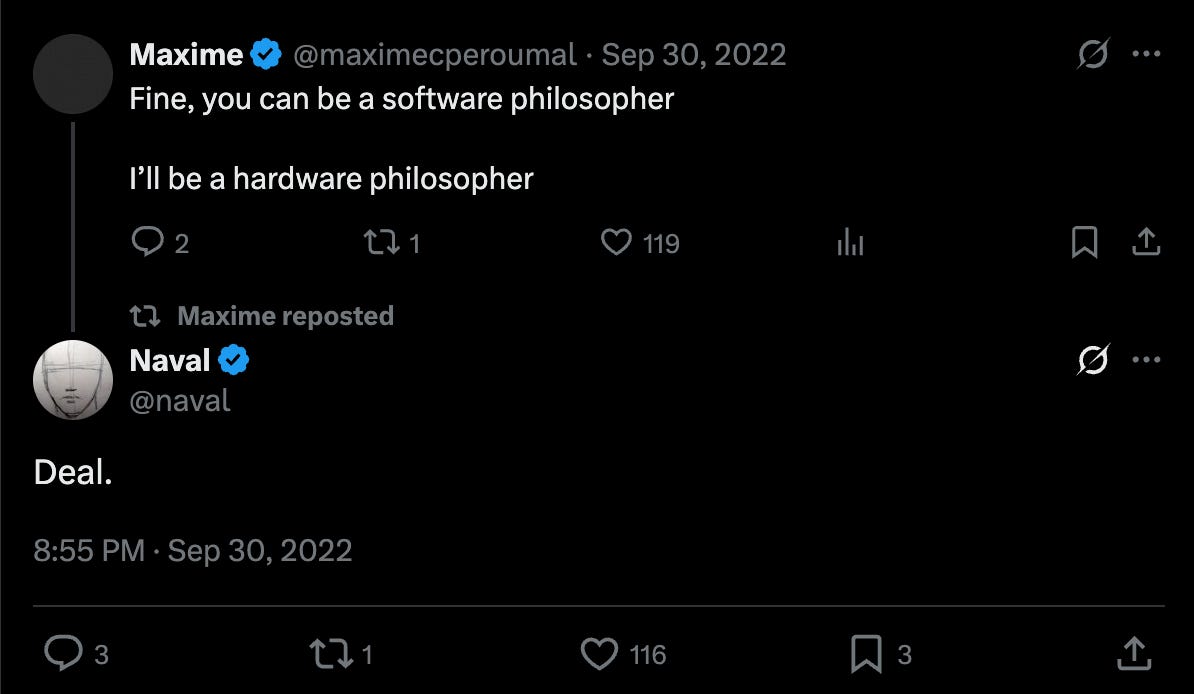Become n of 1
A dinner with Maxime Peroumal at Casa Nautilus
San Francisco,
July 1, 2025
Dear polymath,
This is the first installment of a new series where we share insights from guests at Casa Nautilus. Nautilus is a 3-month residency for young polymaths. Proteges’ stay in SF is fully funded with accommodation, food and equipment included, so they can dive into their craft and build ambitious projects.
Can you ever pay enough attention?
We walk into our home each day, but how did it become one? There are evenings that remind us why we build these strange, beautiful homes like the one we live in—not for shelter alone, but for encounters.
One such evening unfolded last week, when we welcomed Maxime Peroumal to have dinner with us. Maxime built the world’s most popular open-source VR headset at 15 from the countryside in France; at 16, he was dropping out of high school to build his first company, Unison. Today based in San Francisco, he is working on a new AI & Hardware stealth company.
Polymath and self-proclaimed hardware philosopher, he’s known for designing systems that feel inevitable, for building with elegance and speed, and for never waiting for permission.
If you had been there, I think you would have seen it too: the mind of someone who listens faster than most people think. There was no posturing, no thesis or institution to defend—only an analytical, roving curiosity that kept returning to a radical theme: becoming n of 1.
What stuck with me were three coordinates worth returning to as you build:
I. The origin of things
Maxime has a reverence for systems so well-designed we no longer notice them — chairs, glass cups, stop signs. Things we touch and use every day without ever asking: how did this get here?
Think about the clothes you’re wearing right now. Before the Industrial Revolution, women made garments for their families by hand. Mass manufacturing made clothing so commonplace that we rarely consider the complex system that brings it to us, or how it freed women for other pursuits. Similarly, the cups we drink from were once individually hand-blown and crafted over hundreds of years before becoming mass-produced, virtually invisible parts of our daily routine.
“The best engineers of their time worked on the things we now take for granted, although incredibly hard to make. We don’t even know the name of these people anymore.”
Study the history, and understand the how.
II. Become “n of 1” in life
We asked Maxime about institutions, how he views his work in the eyes of others, and whether he chased their approval. He smiled and said:
“If I try to build for others I feel paralyzed, so the only thing I know how to do is build the things I like.”
There was a conviction in himself that being technically right and emotionally clear is a more reliable compass than any credential. He called it being your own “n of 1”—being so unique that the set defining you contains only one element: you. If you're a founder, that set might include 100,000; if you're an engineer, maybe a few million. But the goal is to resist any generic categorization until what's left is just you. Build and create things for yourself. Solve your own problems. Delight your own taste. Move at your own tempo. If it resonates with you, it will likely resonate with others. But even if it doesn’t, you’ve already made something real that one person in the world truly wants: you.
Now, if your ambition is to build things that become mainstream, his advice doesn’t stop there. Maxime shared a great framework to think about whether or not something has the potential to scale:
1. Usability – Can others intuitively use it? Is it functional in their life?
2. Visibility – Do they have access to it? Do they know it exists?
3. Mimetic Influence – Do they want to be part of it because others are? Does it signify something about them?
III. Curating your people
Maxime told us he has sent around 5,000 cold emails since he was a teen. His most meaningful collaborators? All came from cold emails. The life he lives now began as a blank subject line. So he encouraged us to put ourselves out there, but to do it strategically.
Maxime offered us a playbook for reaching out to people with little incentive to help: Start by offering insight on their work. Ask them better questions. Contribute an insight they haven’t heard before. To do that, he told us that at times he’ll spend an entire day studying someone’s work to craft them a very thoughtful email. The care you pour into it will make a difference.
But more than connection and outreach, Maxime also talked about curation:
“I found that I’m much more successful by focusing on finding the right people than trying to change others .”
Whether you’re hiring, collaborating, or making friends—knowing how to recognize people who already move the way you do is key. These are people who will challenge your behavior and push back against ideas, but also work in the same direction as you.
If you had been at dinner that night…
You would’ve also heard about:
An anecdote about Pascal’s scams and their danger (blogpost)
The link between mimetic theory and glowing Apple logos (blogpost)
How Taleb’s Black Swans predict globalization's forecasted demise (book)
But most of all, you would’ve heard someone who speaks with the same wisdom and focus he builds with: nothing left uninvestigated.
Stay building and apply to Nautilus’ next cohort.
Yours very truly,
Cover image: Detail of Neptune and Amphitrite, by Cornelis Van Haarlem, 1583





